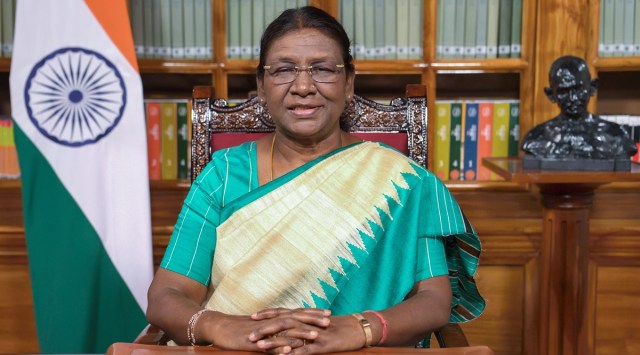UNDERLINING THAT the common identity as citizens of India is “above all” other identities of “caste, creed, language and region”, President Droupadi Murmu on Monday urged people to “move forward with the spirit of harmony and brotherhood”.
Addressing the nation on the eve of the 77th Independence Day, she said: “Each of us has many identities — apart from caste, creed, language and region, we are also identified with our families and professions — but there is one identity that is above all. That is our identity as citizens of India. Each one of us is an equal citizen; each one of us has an equal opportunity, equal rights and equal duties in this land”.

“Our Constitution is our guiding document. Its Preamble contains the ideals of our freedom struggle. Let us move forward with the spirit of harmony and brotherhood to realise the dreams of our nation-builders,” she said.
Recalling the role of women freedom fighters, Murmu named Matangini Hazra, Kanaklata Baruah, Kasturba Gandhi, Sarojini Naidu, Ammu Swaminathan, Rama Devi, Aruna Asaf Ali and Sucheta Kriplani.
“Today, women are contributing extensively in every field of development and service to the country and are enhancing the nation’s pride. Today, our women have made their special place in many such fields in which their participation was unimaginable a few decades ago. I am happy to note that the economic empowerment of women is being given special focus in our country,” she said, adding that “development of women was among the ideals of our freedom struggle”.
Speaking on India’s G20 presidency, Murmu said: “As the G20 represents two-thirds of the world population, this is a unique opportunity to help shape global discourse in the right direction. With the G20 presidency, India can nudge decision-making in trade and finance towards equitable progress. Beyond trade and finance, matters of human development too are on the agenda.”
What is notable in India’s presidency of G20 is the way this diplomatic activity has been taken to the grassroots, she said.
Story continues below this ad
Murmu said India’s economy has proven to be “resilient during turbulent times”, and is a “beacon of hope” for others. “The world economy is passing through a delicate stage, as the pandemic has been followed by international events that have added to the air of uncertainty. Yet, the government has been able to navigate the stormy waters very well,” she said. In this connection, she hailed the contribution of farmers as “annadatas”, saying they had contributed significantly to the country’s growth.
“Inflation at the global level remains a cause for worry. But in India, the government and the Reserve Bank have managed to contain it. The government has succeeded in protecting the common people from high inflation while also providing a more extensive security cover to the poor. The world looks up to India for global economic growth,” she said.
Murmu said the economic progress was driven by a “two-pronged strategy” — a sustained push to enterprise and proactive welfare initiatives for the needy. “Giving priority to the deprived remains the focus of our policies and actions that have lifted a large number of people out of poverty in the last decade. Similarly, there are specific programmes to improve the conditions of tribals and encourage them to join the journey of progress. I appeal to our tribal brothers and sisters to enrich their traditions while embracing modernity,” she said.
Saying that “human development concerns” have also been given priority, she hailed the National Education Policy and said it would “bring in unprecedented changes in the education sector”.
Story continues below this ad
“The aspirations of the new India have infinite dimensions. The Indian Space Research Organisation keeps scaling new heights and setting higher benchmarks of excellence,” she said, as she referred to Chandrayaan-3.
In her speech, Murmu also raised the issue of climate change. Saying that the “culture of greed takes the world away from nature”, she said lessons can be learnt from many “tribal communities who live very close to nature and in harmony with it”.
Towards the end of her 20-minute address, Murmu spoke about working towards making India an “inclusive and developed” nation by 2047.
“Independence Day is an occasion to reconnect with our history. It is also an occasion to assess our present and reflect about our way forward. Looking at the present, we see that India has not only regained its rightful place on the world stage, but it has also enhanced its standing in the international order. During my visits and interactions with the members of the Indian diaspora, I have observed a new confidence in the India story. India is playing a crucial role in promoting developmental and humanitarian goals around the world,” she said.









